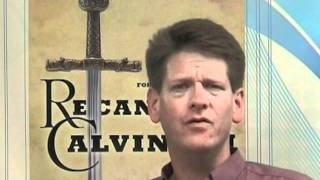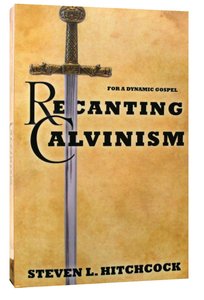Stephen L. Hitchcock
Former Calvinist, Steven Hitchcock recalls: “I had only been a Christian for about a year when I was first introduced to Calvinism. My first year as a Christian was blessed with many opportunities to work with others in evangelism as the Lord had given me a zeal for sharing the gospel. I had just returned to California from a trip to Europe where I had the privilege of meeting Christians from all over the world, when a dear Christian brother dropped a bombshell in my life - Calvinism. I had never heard of it before. My first reaction was a profound sense of awe and wonder of this view of God that emphasized His majesty above everything else. I was duly humbled before such a view of God in which I was informed that He had first chosen me and had caused me to believe. Immediately upon leaving my brother I began to experience a dark period that frequently occurs among those who have no argument against it. Some respond with anger, some with depression, but almost all experience some sort of negative feeling when first confronted with the seemingly irrefutable Scriptural arguments. A common characteristic of this dark period among initial converts to Calvinism is the personal questioning of one’s own salvation. This is because the emphasis shifts from personal faith in Jesus to a view of God holding the keys to our personal salvation in His secret counsels of eternity. The obvious implication of Calvinism for the individual is whether or not he or she is one of the elect. Did God choose me in eternity past to be one of His elect? The whole experience is like crossing a river in which you cannot feel the bottom until you are over on the other side. After a difficult period, everything seemed to change. I suddenly became a debater of Calvinism. I changed gears in my Christian life and never questioned the subtle change in my heart toward the lost. I did notice there had been a change in that area of my life. I became embarrassed about my former ‘work’ of evangelism, as it was not the ‘right way.’ I was then being taught I had been spreading a man-centered gospel, rather than a God-centered gospel. I became inculcated into a Calvinistic fellowship. I was impressed with the sense of the weighty doctrines, the earnest godliness all around me, the profound sense of fellowship, and sermons that conveyed such authority over my life from God’s Word. It was so powerful and the people all around me were so loving and earnest. The thing that was strangely missing was that there was very little emphasis on witnessing and very few, if any souls, being saved. Christians surrounded me, who like myself, had come from other churches, rather than from the world. Witnessing became awkward because now I had to explain what a Reformed Baptist was and it seemed there was a particular understanding that sinners needed to know, in addition to the gospel. The question I have is why do people want to affect you like this? Was it really that important to know about Calvinism? Why did my brother in Lord feel it was so important to enlighten me about these things? Why did I also begin to spread the word about Calvinism? Why was it so important that now it overshadowed the gospel? We ought to stop and question a gospel that proclaims, ‘The wonder is not that He withholds mercy from some, but that He should be gracious to any.’ It sounds so spiritual, so humble, so weighty, and awesome, and yet it is a lie. Because of Calvinism we have actually come to think that God’s great willingness to be gracious is more unlikely than likely.” (Recanting Calvinism, pp.xxvi-xxvii, emphasis mine)
Hitchcock adds: “For almost twenty years of my Christian life I have been a Calvinist. ... I was absolutely certain of the ‘doctrines of grace,’ being truly of that mindset, and yet the cause for concern is not that I have now recanted Calvinism, but that I had shifted from my original faith-centered position of the gospel when I first became a Calvinist. ... I exchanged the joy of the gospel for the glory of Calvinism when the basis of belonging was no longer faith in Jesus, but a complex brotherhood that identified itself as God’s chosen people. To be the Elect, as a Calvinist understands it, is to be one whom God has uniquely selected from out of the mass of sinful humanity. God has bestowed on the Elect a standing before Him that is glorious, because it mysteriously began in eternity regarding an insignificant, finite sinner. To imbibe Calvinism is to imbibe this new sense of glory, ironically seen as profound humility. It is everything to be one of the Elect, for it means that you are ‘in’ and bound for glory. Think of it. He chose you and not another!” (Recanting Calvinism, p.xxvii)
Hitchcock concludes: “I am so very thankful to God that I have come back to the joy of a faith-centered gospel. How wonderfully refreshing to know that God does want everyone to be saved, that Jesus has died for all, and that faith is possible among those who are totally depraved. I call upon Calvinists to join with me in Recanting Calvinism for a Dynamic Gospel.” (Recanting Calvinism, p.xxviii)

